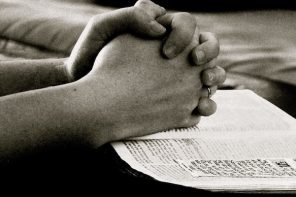The natural progression of life is to move from dependence to independence. When you are a child, you are dependent on someone else for everything. First for even the bare necessities of life, and then into things like clothes, education, and wisdom. But you begin to grow, and you become more self-sufficient in these areas as you do. That’s a good and right thing – we are meant to progress this way as long as we do so with a wary eye on the fact that ultimately none of us are self-sufficient. But as long as we are continually reminded of our ultimate dependence on God to meet our needs, then we should move forward in this progression from dependence to independence.
There is, however, another way to look at this movement:
You move from being a demand on other people to being demanded of by other people. You were a child, and then you have your own children. You were provided for, and then you are the provider. You lived on someone else’s insurance and then you become the source of someone else’s insurance. When you become an adult, then, there comes a demand on your time, resources, energy, and attention. It comes from your employer, from the children, from your spouse, from your friends, and from the church.
When you start feeling the weight of those demands – that everywhere you turn, someone needs something from you, there is an inclination that rises up inside of you. It’s that old instinct of self-preservation. It’s the feeling that no one is looking out for you because everyone is needing something from you.
Now let’s be clear, here – there are moments, many in fact, when you find yourself (as I do) in an over-committed situation, and for the health of your family and even your soul, you need to release some of those demands. But in those occasions, you are releasing some demands so you can fully give yourself to others. It’s not an escaping; it’s a re-aligning of yourself to make sure you are giving what limited resources you have to the most appropriate places.
It’s a tricky issue, then, to walk the line between healthy commitment and responsibility and worshiping at the idol of self-preservation. It might help to diagnose the difference between the two by asking some key questions:
1. What am I planning to do with my increased margin?
This is a helpful question because it will help you see who is at the center of your desire. If you want to free up your commitments so that you can be more engaged in what you know God has called you to do, then by all means free it up. But if you are the only person who will benefit from these changes, then beware the idol of self-preservation.
2. How did I wind up feeling this compulsion in the first place?
If you’re feeling crushed by the weight of responsibility, you didn’t get here by accident. The question is how you got here, and why. Did you get here because of your pride? That you can’t say no to things, even if you don’t have the time or energy to do them well? Or did you get here because this is the road God put you on? If it’s the former, then you need to evaluate your decision-making process. But if it’s the latter, then you can rest in your faith that God will provide the means to do what He has called you to do.
3. Have I stopped believing God will take care of me?
This is really the question at the core. It could be that the reason you have the need to preserve yourself is because you have stopped trusting that God ultimately will preserve you. Asking this question takes us back to one of the most fundamental and simple things we know to be true, and yet we forget so easily: God will take care of me. And if God has my ultimate well-being at heart, my primary goal is not to take care of myself. It’s to follow Him.
Subscribe to MichaelKelley.co
Never miss a new post. Subscribe to receive these posts in your inbox and to receive information about new discipleship resources.





Hello Michael,
This article has helped me significantly. Thank you.